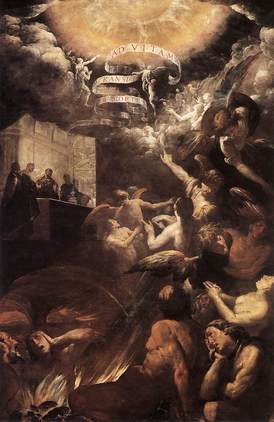The tragic death of Michael Blosil, 18, son of Marie Osmond, the other day brings light to the sad reality of teen suicide. Noted by friends and family of the Osmonds, Michael had been battling the demons of depression.
Tag: spirituality
Practice prayer … it’ll be the best thing you’ve ever done (as least lately)
Practice prayer from the beginning. Paint your house
with the colors of modesty and humility. Make it radiant with the light of
justice. Decorate it with the finest gold leaf of good deeds. Adorn it with the
walls and stones of faith and generosity. Crown it with the pinnacle of prayer.
In this way, you will make it a perfect dwelling place for the Lord. You will
be able to receive him as in a splendid palace, and through His grace you will
already possess Him, His image enthroned in the temple of your spirit.
Chrysostom, homily read at Office of Readings, Friday after Ash Wednesday
How are you approaching Lent this year?
Grant, O Lord, that Thy faithful may begin the solemn days of Lent with fitting piety and may persevere therein with steadfast devotion.
It is time to “begin the time of fasting with joy, submitting ourselves to spiritual struggle” in preparing to live fully the Paschal Mystery of the Lord (His saving life, death, resurrection and Ascension). “By the solemn forty days of Lent the Church unites herself each year to the mystery of Jesus in the desert.” (Catechism of the Catholic Church 540).
 What is asked of those who make the claim to follow Christ? It seems to me that the path to understanding and living these 40 days of Lent in order to live the rest of the year as a true, honest, loving Christian. Lent, oddly enough, is a joyful time when we have a focused embrace of the spiritual struggle played out in acts of contrition, purification and prayerfulness. Often we hear Lent reduced to prayer, fasting and almsgiving. True enough, those are the hallmarks of Lent. But to broaden our sense of Lent let’s think that there is time for fasting, abstinence from certain foods, ways of thinking, acting, speaking, simple living (frugality), restriction of personal desires, intense prayer, confession of sins, and similar ascetic elements are essential to the period of Lent. Lent is a time for good work on the soul and the heart (and the body if need be). No doubt if we take Lent seriously and actually do some these spiritual works, they may be burdensome obligations or unbearable duties. We may even feel a bit despondent or dejected. The spiritual fathers and mothers all tell us that to truly follow Christ with any degree of honesty we have to work on changing our lives by conforming the self to Christ, even if it hurts. How do know how conform the self to Christ? Do lectio divina (see entry 1 and entry 2), pray the rosary, go to confession, do charitable work, spend time in silence alone in personal prayer, adore Christ in the Blessed Sacrament, and go to
What is asked of those who make the claim to follow Christ? It seems to me that the path to understanding and living these 40 days of Lent in order to live the rest of the year as a true, honest, loving Christian. Lent, oddly enough, is a joyful time when we have a focused embrace of the spiritual struggle played out in acts of contrition, purification and prayerfulness. Often we hear Lent reduced to prayer, fasting and almsgiving. True enough, those are the hallmarks of Lent. But to broaden our sense of Lent let’s think that there is time for fasting, abstinence from certain foods, ways of thinking, acting, speaking, simple living (frugality), restriction of personal desires, intense prayer, confession of sins, and similar ascetic elements are essential to the period of Lent. Lent is a time for good work on the soul and the heart (and the body if need be). No doubt if we take Lent seriously and actually do some these spiritual works, they may be burdensome obligations or unbearable duties. We may even feel a bit despondent or dejected. The spiritual fathers and mothers all tell us that to truly follow Christ with any degree of honesty we have to work on changing our lives by conforming the self to Christ, even if it hurts. How do know how conform the self to Christ? Do lectio divina (see entry 1 and entry 2), pray the rosary, go to confession, do charitable work, spend time in silence alone in personal prayer, adore Christ in the Blessed Sacrament, and go to
The liturgical season of Lent is 40 days -not a long period of spiritual training–and it ought to be regarded as an invaluable and divine gift from a God who loves us and wants us to be in relationship with Him. It is a sacred time of divine grace, which seeks to detach us from things material, lowly and corrupt in order to attract us toward things superior, wholesome and spiritual (see Catechism 1434-9). As one Christian leader said, “Lent is a unique opportunity to remove from the soul every passion, to rid the body of everything superfluous, harmful and mortal. Accordingly, then, it is a time of immense rejoicing and gladness. Lent is a genuine feast and time for exhilaration!”
Fasting expected of us by the Church, as well as the abstinence, frugality, restriction of personal desires and unnecessary pleasures or expenses, literally constitute a prescription for salvation. This is especially true this year, when our world has experienced a global economic crisis, filled with imminent danger of bankruptcy not only for individuals and companies, skyrocketing unemployment, the creation of entire hosts of people plagued by poverty, nihilism, depression, crime, and other societal ills. Lent is an education that labors to instruct us in a particular daily journey with not a great sense of “success,” without the arrogance and entitlement of extravagance, waste and bravado. It encourages us to surrender all forms of greed and ignore the challenges of commercial advertising, which constantly promotes new and false necessities (see Catechism 1430-3).
The Lenten season provokes us to limit ourselves to what is absolutely essential and necessary in an attitude of dignified, deliberate simplicity. Christian leaders advise us not to be a consuming or compulsive herd of thoughtless and heartless individuals, but a culture of sensitive and caring persons, sharing with and supporting our “neighbor” that is in poverty or recession. Finally, Lent informs us about patience and tolerance in moments of smaller or larger deprivation, while simultaneously emphasizing the need to seek God’s assistance and mercy, placing our complete trust in His affectionate providence.
That is how Christ envisions Lent. That is how the saints lived Lent. This is how the Church Fathers undertakes the struggle of Lent. This is how our faith has traditionally understood Great Lent. This is how the Church in
Sin is in opposition to God’s infinite holiness
I went to confession the other day. I try to go once a month and for the most part I make that commitment. For some reason, it was a about 8 weeks since I darkened the confessional. I was leaving that afternoon for my hermitage day (spoken of in another blog post below) and Lent was fast approaching. Going to confession was awkward, lonely, fearful BUT intensely gratifying, freeing, and loving. Facing one’s sinful nature is NEVER easy; it is NEVER anything but a hassle, it is NEVER anything but embarassing but it is the only way I know how to be honest with myself in front of God. As an Opus Dei priest tells me when I see him occasionally for confession: you’ve got sin, I’ve got the grace for you to live … by the ministry of the Church. Of course, this priest is echoing the notion that I am not confessing my sinful self to him personally (I really don’t think he cares one-way-or-another truely in the best sense) but ipse Christus –to Christ Himself. I read the passage noted below from a rather famous spiritual treatise today and the last line from sacred Scripture struck me: If anyone would come after me, let him deny himself. Do you have a clear understanding of mortal sin? Have you gone to confession? How is your struggle with sin going in the face of grace?
Only mortal sin is completely opposed to God; this opposition is so great that it separates the soul from God. However, every sin, even venial sin, and every fault and imperfection, is in opposition to God’s infinite holiness. Therefore Jesus offers the perfection of his heavenly Father as a norm for our Christian life, and engages us in an intense struggle against sin in order to destroy in us its deepest roots and even its slightest traces.
This is what Jesus teaches in these few short words: deny yourself. We must deny self with all its imperfect habits and inclinations; and we must do so continually. Such a task is fatiguing and painful, but it is indispensable if we wish to attain sanctity. Jesus says: The gate is narrow and the way is hard that leads to life, and those who find it are few (Mt.
In echo of Jesus, all the masters of the spiritual life insist strongly on detachment and self-renunciation as the indispensable foundation of the spiritual life.
But first and foremost, it is Jesus, the divine Teacher, who has pointed out to us the absolute necessity of passing through this way: If anyone would come after me, let him deny himself (Mt.
Divine Intimacy
Hermitage Days
 Being busy about many things affords one many distractions, which can be a good thing. Very often, being too busy and distracted offers no consolation and actually makes life less interesting, less thirsty for God, less able to hear the promptings of the Lord, less focused on substantial matters of life. Perhaps one can say less able to take serious our own reality. But life is not about measuring up to a standard as it is about a relationship, time spent in the company of the other person (though the other person be yourself).
Being busy about many things affords one many distractions, which can be a good thing. Very often, being too busy and distracted offers no consolation and actually makes life less interesting, less thirsty for God, less able to hear the promptings of the Lord, less focused on substantial matters of life. Perhaps one can say less able to take serious our own reality. But life is not about measuring up to a standard as it is about a relationship, time spent in the company of the other person (though the other person be yourself).

Leading the soul to God by the method of the Ignatian Spiritual Exercises
I came across this entry in an old encyclopedia. In its brevity a lot of truth is revealed: we can work (asceticism) by reason, and the heart, to union with God. Consider for a second what the author, Fr Drum, has to teach. Also, remember that Ignatian spirituality is not the same as Jesuit spirituality. The two are not the same by any stretch of the imagination. Fr Drum tells us that it is possible through prayer and good spiritual direction to know, love and serve God in this world so as to do the same in the next. Many people today don’t have the confidence that knowing and loving and serving God is possible at all. Some don’t know that God wants our happiness today –in this life–that there is meaning to our life that includes suffering and love (& joy) and some reject the notion that we are oriented toward a final goal. Christians call this goal heaven, the Beatific vision, communion with the Trinity, etc. What else is there for the Christian who really prays and lives his or her life with the Gospel and with reason? I get the sense that they don’t have the certainty that God knows us personally and intimately, never mind having a relationship with bodiless being.
I spent many years being formed by Ignatian Spirituality. My personal, cultural, ecclesial life (taken as a unity) is informed by what Saint Ignatius of Loyola proposed in his Spiritual Exercises. But I would not be telling the whole truth if I didn’t say that other influences have had a strong influence in how I look at my life and life’s work today. My life intersects with Monsignor Luigi Giussani, Chiara Lubich, Saint Josemaria Escriva, Saints Francis & Dominic and Saint Benedict and this school of the Lord’s service. The host of women saints and blesseds are too cumbersome to note here. The point, however, is not my interpretative lens except to say that I have benefited from the Spiritual Exercises and perhaps you might think the same if you gave the Exercises a chance. They are clearly an apostolic method in the spiritual life with an incredibly strong contemplative aspect. The Exercises are not for everyone, so be patient with them if you attempt to do an Ignatian retreat.
Ultimately, what the author of this entry names as the goal of the Christian life is my own, regardless of the influences: To live is Christ. It is entirely consistent with the motto of my coat of arms seen above: sequela Christi (to follow Christ). Ignatius (and the other spiritual masters noted above) could not conceive of life any differently. Would that be the same for all people!
The entry:
The spirit of Saint Ignatius was Pauline, — intrepid yet tender; motivated by two great principles,–love of Jesus Christ and zeal for the salvation of souls. These two principles were brought together in his motto: A. M. D. G., “Omnia ad Majorem Dei Gloriam” (All for the greater glory of God). It was this spirit, which breathed in “The Spiritual Exercises,” a method of asceticism, that is the very soul of the constitutions and activities of the Society of Jesus.
This little book is said to have converted more souls than it contains letters.
Certainly the results it has produced down the centuries cannot be exaggerated. The importance of its method is proved by the mere fact that 292 Jesuit writers have commented on the whole work. The purpose of the Exercises is definite and scientific upbuilding of the reason, will and emotions, by meditation and contemplation on the fundamental principles of the spiritual life and by other exercises of the soul. First, God is rated rightly as the soul’s end and object.
Reason is convinced that God is the end for which the soul is created, and all things else are only means to bring the soul to God; hence it follows that that is good which leads the soul Godward, and that is evil which leads the soul awayward from God.
The soul’s awaywardness from God results in sin; so sin is studied both in itself and in its consequences to the soul. Secondly, Jesus Christ is put in His place in the soul, by meditations on His ideals and contemplations on His private and public life.
The soul now aspires to the very height of enthusiastic and personal love to Him; and to the most self-sacrificing generosity in following the evangelical counsels.
Thirdly, the high resolves of the soul are confirmed by the imitation of Christ in His passion. Lastly, the soul rises to a sublime and unselfish joy, purely because of the glory of its risen Lord; and leaps with rapturous exultation into the realms of unselfish and perfect love of God, such as Saint Paul evinced when he cried out: “To me, to live is Christ; to die were gain” (Philippians 1, 21).
Fr Walter Drum, SJ
The Encyclopedia Americana, 1919
Praying for what God wants
Leisure is under-rated
Leisure is not idleness or the pursuit of recreational
activities. It is, above all, being attentive to the present moment, open to
all its implications, living it to the full. This implies a certain looseness
in life style that allows heart and mind to drift away from time to time.
life is not a matter of shoehorning the maximum number of good works into a
day. It is more important that monks and nuns do a few things well, being
present to the tasks they undertake, leaving room for recuperation and
reflection, and expecting the unexpected.
present. It is the opposite of being enslaved by the past or living in some
hazy anticipation of a desirable future. Leisure means being free from anything
that would impede, color, or subvert the perception of reality. Far from being
the headlong pursuit of escapist activities and having fun, authentic leisure
is a very serious matter because it is the product of an attentive and
listening attitude to life.
Man has an inexhaustible desire for the Infinite
Why does faith still have any chance at all?… Because
it corresponds to the nature of man…. Man possesses an inextinguishable
aspiration, full of nostalgia, for an infinite. None of the attempted answers
will do; only the God who himself became finite in order to tear open our
finitude and lead us into the wide spaces of his infinity, only he corresponds
to the question of our being. That is why, even today, Christian faith will
come to seek out man again.
with our exhaustion, with our propensity for melancholy, with this strange
masochism that life tends to favor nowadays, or with this indifference and
cynicism that life produces nowadays as a way of avoiding the suffering of an
excessive and unwanted fatigue, how could we ever accept ourselves and others
in the name of a discourse? We cannot sustain love for ourselves unless Christ
is a presence, as a mother is a presence for her child. Unless Christ is a
presence now – now! – I cannot love myself now and I cannot love you now.
Giussani
Raising up saints and intercessors: witnesses to Christ urgently needed
A Church that
no longer raises up holy men and women among her priests, laypeople and
religious is a sterile mother. In fact, what matters the most is not the
construction of huge buildings or realizing great projects. What the Church needs
most is the witness of saints. Holiness is the sign of the Church’s
credibility. They are her letters of reference.
Ghattas

